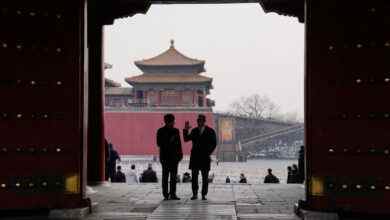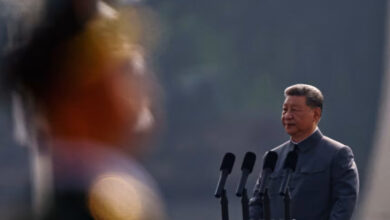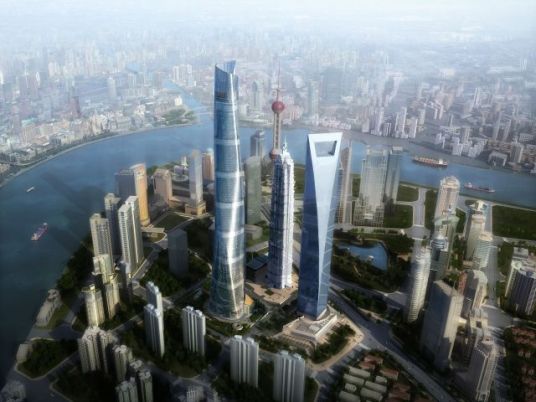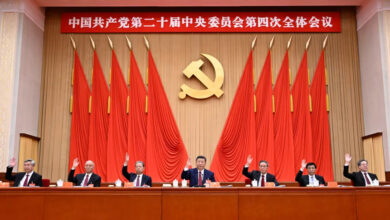Beijing–Economic power is leeching from the old world to emerging markets. The politics of globalization are not keeping pace with this shift. And that makes it hard to agree on joint action to tackle urgent issues such as how to reduce China's external surplus.
The Group of 20 summit in Seoul amply corroborated each of these truisms. The risk now is that, in the absence of policy coordination, a purely market-driven adjustment of global economic imbalances will be messier than it need be.
And where market forces are not allowed to prevail, as is the case with China's exchange rate, the temptation for politicians in the US and Europe to try to force the adjustment through tariffs and import barriers can only grow.
"There is a pervasive sense that the G20 has reached the limit of cooperative efforts towards re-balancing of the world economy," said Eswar Prasad, a Cornell University professor and a senior fellow at the Washington-based Brookings Institution.
With advanced economies barely plodding along while emerging markets are enjoying red-hot growth, reconciling the different types of policies required has become difficult, Prasad said.
"In an increasingly integrated world economy with emerging markets playing a prominent role, cross-border spillovers of domestic policies then set up a situation ripe for conflict," he added.
These conflicts were on show in Seoul. Emerging economy members of the G20 flailed the easy-money policies of the Federal Reserve, the US central bank; President Barack Obama, beset at home by high unemployment and low growth, urged Chinese President Hu Jintao to ease the pressure on American manufacturers by letting the yuan rise faster.
But the writ of the US in the global economic system no longer runs unchallenged.
Gone are the days when a US Treasury secretary could gather four counterparts around a table and set in motion sweeping changes to exchange rates and trade positions.
In the eyes of policymakers in many developing countries, US primacy and credibility have been eroded by the global financial crisis, which had its origins in the US sub-prime mortgage meltdown.
The ultra-loose monetary and fiscal policies that the US has adopted in response is testing faith in the dollar to destruction–and not just among the likes of China and Russia.
No less a figure than World Bank President Robert Zoellick, himself a former US Treasury official, said last week it was time to start thinking about building a new monetary system.
So it is little wonder that Washington has repeatedly failed to get Beijing to do its bidding on the yuan. In Seoul, a different tactic fizzled: The G20 refused to back a US plan for numerical targets for current account surpluses and deficits–a roundabout way of applying peer pressure on China.
Instead, Hu stuck to Beijing's well-rehearsed stance that the yuan's rate of climb would remain gradual and calibrated to China's national interest. In case someone had not heard the first time, Hu repeated his position at an Asia-Pacific leaders' meeting on Sunday in the Japanese port city of Yokohama.
Stewart Patrick with the Council on Foreign Relations in New York said the Fed's recent decision to embark on a $600 billion bond-buying program had undercut Obama at the summit.
Moreover, his party's trouncing in mid-term Congressional elections had made his G20 counterparts skeptical of the president's ability to deliver on global commitments
"Confidence in US global economic leadership continues to wane," Patrick said.
"VICTORY FOR EMERGING MARKETS"
Illustrating how the sands are shifting, the G20 gave its blessing to developing countries such as Brazil that opt for capital controls to prevent incoming walls of cash from pushing up already overvalued exchange rates.
Not long ago, such curbs were anathema to the US and the IMF.
In another nod to the growing clout of developing countries, the Seoul summit formally endorsed a deal that gives them more power in the running of the IMF, largely at Europe's expense.
"On balance, this G20 meeting was a victory for emerging markets," commented Lena Komileva, head of G7 market economics at Tullett Prebon.
The G20 is not doomed to deadlock as emerging giants try to wrestle power from advanced economies. As well as settling on a redistribution of chairs and shares at the IMF, the group agreed new rules designed to avert future bank collapses.
But the Seoul stalemate over imbalances points up the group's limitations when it is not confronted by an immediate crisis, as it was at the first G20 summit two years ago.
Then, the freezing up of global credit markets and the onset of recession concentrated minds and generated a coordinated stimulus in response.
Today, divergent trade and inflation trends are leading to tension rather than policy coordination, according to economists at J.P. Morgan.
"Ironically, this tension is likely to produce a desired aggregate outcome — an easier global monetary policy setting that increases the likelihood of a strong global growth outcome next year.
"However, widening imbalances alongside inappropriately synchronized policy stances raise concern that the eventual global policy normalisation will prove far more disruptive than necessary," they wrote in the bank's weekly Global Data Watch.




